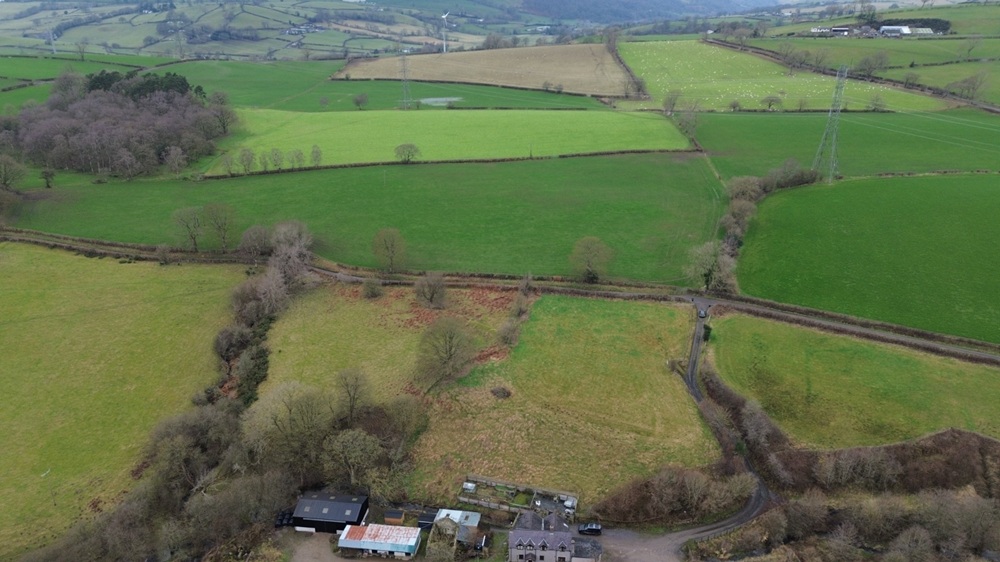Residents fear toxic fumes from electric battery storage facility

Richard Evans, Local democracy reporter
A resident’s group is opposing plans to build a large electric battery storage facility in their village – fearing explosions and toxic fumes.
Developer NatPower is proposing to create a large Battery Energy Storage System (BESS) on farmland just outside Gwyddelwern, near Corwen, naming the project Ynni Celyn.
Now residents have set up a group, the Ynni Celyn Opposition Group, in opposition to the plans.
The battery plants store surplus electricity created so the power can be used later.
NatPower said the batteries which would be used “have been proven to be very safe” and said their fire safety measures are “developed in collaboration with local fire authorities”.
They said energy storage projects like Ynni Celyn “can play a vital role in cutting energy bills”.
Battery fire
It was in response to fears from the residents’ group of explosions. The group cited an incident which happened in the USA earlier this month.
According to US reports, over 1,200 residents had to be evacuated after a battery plant fire at Moss Landing, Monterey County, California, where a state of emergency was called.
The American media reported that U.S. authorities were measuring levels of toxic gasses in the atmosphere, including hydrogen fluoride, a deadly colourless gas, created by lithium ion battery fires.
Natpower is currently taking part in a consultation phase, notifying residents of their plans, before submitting a planning application to Denbighshire County Council.
Resident Dr. Kevin Sharp explained the residents’ fears. “It (the site) is extremely large. If it goes ahead, it would be one of the largest in the world,” he said.
“A group of us who live locally are attempting to oppose this on a number of grounds with safety being primary. We have named ourselves the Ynni Celyn Opposition Group.
“Our contention is that, despite the best efforts of the industry, it is impossible for anyone to guarantee the safety of people who live near to one of these large installations.”
He added: “The fact that fires and explosions keep happening – like the one in Moss Landing, California, only last week – is clear evidence of that if these things have to be built at all, they should be built far away from where people live and work.”
‘Under threat’
Fellow resident Janet Rogers added: “Our village of Gwyddelwern is under threat.
“A colossal BESS facility containing lithium batteries is proposed by Natpower a mere 76 meters from a private property, dangerously close to our homes, farms, factories, and schools.
“We are a close-knit community of residents who work hard to cherish our clean environment, families, and livelihoods but now face the grim prospect of construction and pollution, lithium battery explosions, and the release of toxic plumes.”
John Sturman, managing director of NatPower UK, commented: “Lithium-ion batteries have long powered the devices we use day-to-day, from laptops and mobile phones right through to EVs. They have been proven to be very safe.
“Safety is also paramount for our battery energy storage projects, with fire safety measures developed in collaboration with local fire authorities and a sustainable drainage system to contain and test water run-off.
“For example, our battery units will be containerised, with all containers set apart from each other by several metres.
“Energy storage projects like Ynni Celyn can play a vital role in cutting energy bills for Welsh households and providing power price certainty for businesses while helping Wales achieve its clean energy ambitions.
“They do so through storing excess, low-cost renewable energy and releasing it when it is needed most. That enables the country to move away from volatile imported gas prices and decarbonise the grid.
“We chose this site based on analysis of millions of parcels of land across the country and a rigorous assessment process.
“We prioritised brownfield sites within that process but found no other suitable options along this grid route.”
He added: “We aim to be long-term partners in our communities.
“As such, we will establish a Community Energy Transition Foundation for the Ynni Celyn project that will contribute up to £1 million per year to combat fuel poverty and support local sustainability projects, delivering lasting benefits locally.
“We are also committed to delivering significant nature uplift across all our projects, protecting and restoring Wales’ natural environment for future generations.”
Denbighshire County Council were also invited to comment.
Support our Nation today
For the price of a cup of coffee a month you can help us create an independent, not-for-profit, national news service for the people of Wales, by the people of Wales.





I wonder if there is a data facility being built locally. That is what happened in Cardiff near the steel works. They said about storing energy from renewable for the grid but a data facility was bring built next to it. We objected due to risk of fire and we got laughed at and it got approved.
There are better ways to store energy similar to electric mountain, to pump water back up the dams in Elan Valley when there is excess electricity. There is already a hydroelectric plant at elam valley.
The CAPEX cost is much much higher for pumped storage. Additionally, you have the challenge of grid connection. In the UK, you can only install storage and/or renewables if there is an existing grid connection as the National Grid has a 5+ year backlog. Batteries can go anywhere there is a High Voltage line, whereas pumped hydro has to be geographically suitable and also have a local grid connection. Currently, only viable grid storage is still battery, but it only provides day-to-day storage A major challenge is inter-seasonal and inter-annual storage. If you want to make some money, some good… Read more »
Not even day to day. More like minute to minute. The application is called frequency protection.
fair point!